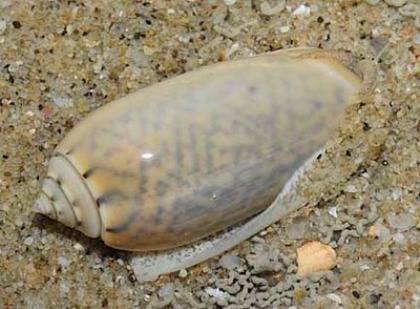Adaptation

Organisms have to adapt to their environment as time goes on and
changes occur. Often times, there are changes in the
organism's normal habitat that force them to adapt, whether it
be varying levels of moisture and temperature, scarcity of certain
foods, or even the introduction of a non-native species into the
organism's habitat.
The Movement
The research of Molly Van Appledorn and her colleagues focuses
on the effects of zebra mussels on Campeloma decisum, helping to illustrate different
adaptations that Campeloma decisum have developed to
maintain their existence. One of the m ain adaptations that
Campeloma decisum have developed is their unique vertical
movement, or their burrowing ability. They have adapted
this behavior, not only to protect themselves from predators by
hiding in the water's floor, but also to protect themselves from
drying out. Campeloma decisum love wet environments, so it
is obviously unfavorable for them to go through
desiccation.
Therefore, their burrowing ability has proven to be extremely
beneficial for their survival.
ain adaptations that
Campeloma decisum have developed is their unique vertical
movement, or their burrowing ability. They have adapted
this behavior, not only to protect themselves from predators by
hiding in the water's floor, but also to protect themselves from
drying out. Campeloma decisum love wet environments, so it
is obviously unfavorable for them to go through
desiccation.
Therefore, their burrowing ability has proven to be extremely
beneficial for their survival.
The Energy
Campeloma decisum are
much more vulnerable when they are colonized by zebra mussels.
Predators do not seem to mind that Campeloma decisum are
infected with zebra mussels (even when Campeloma decisum
have up to 20 mussels attached to them).
The attachment of zebra mussels causes a physical coercion on
the movement of Campeloma decisum. They are less likely to
burrow deeper since they are carrying around all the extra
weight. To attempt to adapt to this negative effect,
Campeloma decisum are able to exert immense amounts of energy
with hopes to borrow as deeply as they normally would if they
were not infected. This adaptation, however, is not always
successful (Van Appledorn et al., 2007).
Through these adaptations, Campeloma decisum are able
to respond to their ever-changing environment in an attempt to
maintain a stable lifestyle.
Follow Campeloma
 into the kitchen to find out what
Mother Gastropoda
into the kitchen to find out what
Mother Gastropoda
 is cooking
up for some tasty
Nutrition.
is cooking
up for some tasty
Nutrition.
Questions so far? Contact
Me.
Head back Home.